By Mark Frost, Chronicle Editor
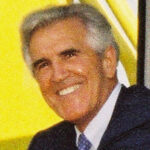
Joe Bruno died Tuesday, Oct. 6, at the age of 91. For 14 years the Glens Falls native and Rensselaer County Senator was New York’s Senate Majority Leader, one of the “three men in a room” who ruled New York State — the Governor, the Senate Majority Leader and the Speaker of the Assembly. Mr. Bruno grew up poor in a family of 10 in a house on Walnut Street without hot water or central heat in the East End of Glens Falls. Mr. Bruno’s father, an immigrant from Italy, could not read or write. His mother was seriously ill for more than a decade and died at age 44.
In 2002, then Senate Majority Leader Mr. Bruno sat down with The Chronicle for a lengthy interview that explored his roots. Here are excerpts.
M-What did you do for fun when you were a kid?
S- Not a lot really. Hang around on the streets and go up to the playground, the Sagamore playground. The upper end of Walnut Street was called Sagamore Street, but it was literally the upper end of Walnut. And there’s a little playground there, I remember had a few swings and a place to play ball. And we’d go up there and hang out.
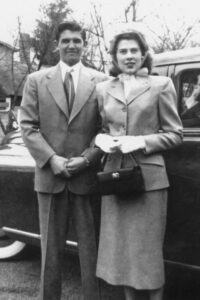
Probably the most fun I ever had was when I became a Boy Scout. I’d get involved in Boy Scout activities: camping, hiking. We went camping up to Wakpominee. I was a Scout leader then and became a patrol leader. And that was really, probably it in terms of leisure activities because we worked, us kids, all eight of us, as soon as we were able we went to really work to help because my father was supporting eight children and a sick wife and we had limited hospitalization.
She used to come home because hospitalization would run out. They’d send her home from the hospital and we set her up in the living room where there was a little day bed. She lived in the living room on the day bed because she couldn’t go up and down the stairs. It wasn’t really fun with eight kids, a sick mother, and the flat that we lived in was an up and down, a duplex.
My grandmother, they owned it and we moved there because it was essentially rent free. There was no central heat. I remember there was a little tiny oil stove in the living room that we’d put like a gallon of oil in back end of it. And there was a wood stove in the kitchen. That was the heat for the whole house….
I don’t know how we lived and survived because in this day and age they wouldn’t let a family live in a place without hot water with ten people and no central heat. The only heat upstairs was from a little pipe that came up from the oil stove to the chimney outside. There was not heat.
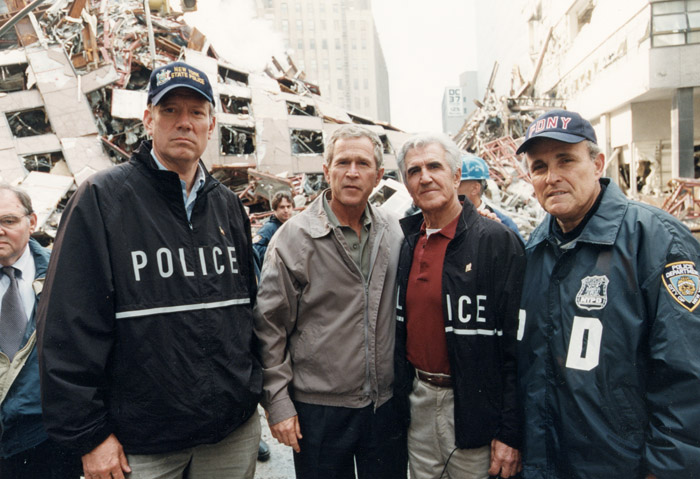
Cripes, you’d wake up in the morning as a kid and there would be frost and inside all the windows.
And we all slept, ’cause there were only three bedrooms up there, so there were four of the boys sleeping in one room, two in a bed. And they were small beds. And then there were two in the smaller bedroom and my two sisters lived in the front.
And my mother and father lived downstairs, in the living room on the day bed. But, my father working the tower work, he would sleep many times during the day and use the front bedroom where my sisters stayed, when they were at school or out…
But, I gotta tell you, when you talk about fun, I don’t remember having a lot of fun as a kid because it was a struggle, constantly working and trying to help out. It was tough because with no central heat in the house it was a struggle. And with no hot water, they’d heat hot water on this little stove and I don’t know how on earth we did it. And that was what you’d wash up with warm water that you’d heat up.
Now the boys would, like at school or when we got into sports, would take showers and I would go to the Buddy Club that I found out afterwards was kind of a club for underprivileged youngsters.
The YMCA let the Buddy Club use the YMCA facilities on Saturday mornings and that was primarily how you’d get a shower.
The Rotary Club would sponsor kids, youngsters, in the Buddy Club and I remember I had a sponsor, Dr. Mitchell, who kind of was the nicest people to me as a kid that I remember. He ended up paying for me to go to camp because that was part of what they did as sponsors. And at Christmas I remember him taking me up to his house and having dinner during Christmas week.
It’s funny when I talk about the shirt factory, dress factory, McMullen Leavens, the first job that I really remember as a kid, I was probably about 8 or 9 years old. My job was to carry a tray of pastries from Bohr & Donohue’s bakery, right on the corner of Lawrence and Walnut. There was one house between where I lived and the bakery. So, I would go over there like at 6 in the morning, get this big tray of pastries and carry it over to the cafeteria at McMullen Leavens, so when the cafeteria opened I think at 7 or so.
There were donuts and twists and my pay was day old pastries and that’s what we ate for breakfast. They’d give you pies and cakes and bread and rolls, and I remember I’d come home with it and by then it the kids were up to go to school. And that’s mostly what we had for breakfast.
I did that for a while and then as I got older we sold newspapers. I had a Post Star route. We got up at 6 in the morning and I remember I had about 123-124 customers in the East end. And when I started I didn’t even have a bike. I carried the darn papers and dragged the bag as a 12 year old or however old I was then.
Before that I sold newspapers on the street after school, 3 cents a paper. Your paper probably costs about that now!….But, it was 3 cents a paper and we got a penny a paper and I had 10 papers to sell. And boy I gotta tell you, you sell papers in the middle of the winter on the street and I remember Kresge’s and Fowler’s, they were the two best places to stand in front of, so the kids on the street who were selling would be pushing to see who would get there first and be able to sell papers. When we sold our 10 papers we went home.
I did that before I was old enough to have a route where you had customers and you’d deliver everyday except Sundays, as I recall, and then collect on Saturdays.
And then when I was 13 or so I was setting up pins at the bowling alley along with the paper route, at the Knights of Columbus. You remember when they had bowling lanes? You know where the Knights building is? Well, under that there was a bowling alley and a bar and I worked there for a couple or three years setting up pins at night and for a while I did both.
But, after a while I just, well you know, ‘cause you’d work there until 12 or 1 in the morning setting up pins and then get up at 6 and as a 12/13 year old kid. I would earn 8 or 9 bucks a week setting up pins and 7 or 8 dollars a week delivering papers which was huge.
I only think my father, during that time, was making about 100 dollars a week. So, that was huge in terms of helping. And when we worked all my brothers worked as well,…and we used to turn it in. It wasn’t like we were spending the money, we’d turn it in. And I remember we’d get a nickel or a dime sort of as an allowance. And that was okay, we wanted to do it, we felt …which amazes me today when I think of my youngsters coming up, the four of them and my grandchildren…but with us we knew that the family had a need and we would all want to do something and pitch in and lots of times it was no fun.
One of the worst jobs I remember when I was 14 and I think I was delivering papers as well, if you can imagine, I was paid for working from 4 in the afternoon during the summer until 2 or 3 in the morning answering phones for Grady’s Taxi Cab company. Fifty cents for working a day, 7 days a week, $3.50 a week working from 4 until 2 or 3 in the morning or 1 and you never knew when you were going home.
You remember Fan and Bill’s? Well, when the band from Fan and Bill’s [restaurant at what is now the Mount Royal Plaza in Queensbury] called to get a cab to go home, that’s when I could go home. And boy I gotta tell you, when I think of that as a kid, it makes you cry for crying out loud. Working for $3.50, 7 days a week all summer and my brother Pete did it before me, he was a year before me.
S-My father never had a car. We never had a telephone in the house until I was 18 years old, never had a TV. I remember when TV was just coming out when war broke out. TV’s were all over, but we were late in getting one. We had a little tiny radio, but we never had a phone….
When my mother died, on Easter Sunday, one of the neighbors — they called my neighbor ’cause she was in a nursing home and they knew she couldn’t recover. There was a knock at the door at 6 in the morning and I remember my father going to the door knowing that it was probably a call saying that my mother had died and it was. On Easter Sunday in ‘47 as I recall….
I got a job at $14 a week when I got outta high school working at the Hovey Ice Company. Do you remember that at all?
And let me tell you, Fred Hovey was a saint in my life because I went to work for Fred Hovey, delivered ice for $14 dollars a week and my brother Vito was already working there.
And I was small when I was in high school, only weighed about 125-130 pounds and tried to play sports, but it didn’t work out too well ‘cause I was so small, but I played.
Fred Hovey kinda took a liking to me ’cause I was hustling all the time. And an ice route became available. Two boys, the Irving brothers, had a nice route in Hudson Falls. I delivered in Glens Falls with Fred’s truck. I was an assistant. The driver was a little guy who cut the ice and then we carried it in, my brother and I. That became available.
The Irvings were in business for themselves. They bought the ice from Fred Hovey wholesale and delivered it retail in Hudson Falls primarily and Fort Edward. That became available. I asked Fred after being there for one summer if I could take over that route. I was out of school by then. He said that there were two of them and it’s pretty hard for the two of them to do it. You can’t do it. I said just give me a week to try it.
That man gave me this old 1929 Stewart truck with the canopy over it — those old ice trucks. He gave me that and he gave me a week’s worth of ice…from that ice I made more money than I ever dreamed anybody could make.
We delivered anywhere from 3-5 ton of ice a day in 50, 75, and 100 pound blocks and in crushed ice for restaurants. And 7 ays a week and Sundays were light days, you maybe worked 3-4 hours that day.
I used to get up at 5 in the morning and work all summer until anywhere from 7-9 at night and drive the ice truck. I didn’t even have a car, early, as I recall. And then I eventually got an old car….
Some winters I actually worked on the ice pond cutting ice and putting it up with them. And you talk about a job 10 below zero, 20 below zero on our break from college. I went to Siena and I drove back and forth for the first year, commuted.
And then Skidmore opened up that extension on Chester Street [later the long-time home of the Salvation Army], so I went to the extension. And then the last year or two was on the campus [in Saratoga].
But I was able to commute once I was at Skidmore and kept the ice truck all the way through college. I’d wear my jeans into classes that would be all soaking wet from delivering ice.
Sometimes, I go down to take classes and come back and finish the ice route. I got interested really.
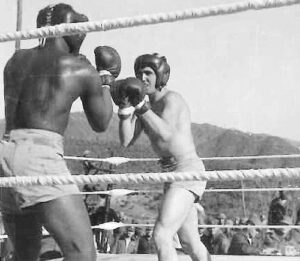
Once I went to college and graduated from college, I got drafted into the Army. I ended up going to Korea. I was a private in the infantry. I got there a couple of months before the war ended, as I recall, a month or two before.
While I was in Korea I went from private to first sergeant in an infantry company. Company F in the 35th Regiment in the 25th Division, called the Tropical Lightning. After the war ended we were just running the hills cleaning up, picking up barbed wire, doing all kinds of things that weren’t a lot of fun, just plain hard work to keep you busy.
I went out for the boxing team and the 35th Regiment was a regimen that they made the picture, From Here to Eternity. They called it the boxing regiment. So, I got in this tournament. I ended up being undefeated and being the 25th Division light-heavy weight champ in ‘53 as I recall.
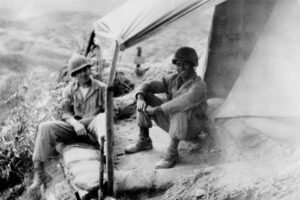
The first year that I got out of high school, when I was working on the ice truck, I went from 130 pounds to 162 pounds. And then four years later when I went into the service, I was probably in the best condition of anybody that was in that regimen.
After delivering ice for four or five years, when I was weighed in I was 172 when I was boxing. And delivering ice, I didn’t have to get in shape when I went into the service. So, I had a big head start with people.
When I got back I got a job as a door-to-door salesman in Albany, commuting and became a manager. I sold the Amana Food Freezer plan and went into Fowler’s Department store. Corner of Park and Glen. They took on the Amana, I was their manager. I stayed there.
Once I got into sales I took an interest in the community and doing things because it was good for business. I got involved with the JC’s, the Junior Chamber of Commerce. I was an optimist in the Optimist Club and as I recall, I became president of it.
I was very active with the Chamber and was membership chairman of the Chamber for a while. I was getting more and more involved in the community.
I became involved in the JC’s, the Junior Chamber of Commerce. I became the president of the Warren County Junior Chamber and their whole reason for existing was individual development through community service.
That got me into the community doing all kinds of good things, we raised moneys for charity, we did all kinds of things. But it got me involved civically. And I stayed involved with them.
I actually became state vice president. I ran for president of the JC’s I remember in Jamestown. It was the only election I ever lost….It was probably one of the best things that ever happened because I ended up getting more involved in the Young Republicans through Jim Donnelly, who was mayor (later), and Lloyd Demboski who was very involved with the Young Republicans.
I became president of the Young Republicans in Warren County and then I became state president of the Young Republicans….The Young Republicans we did all kinds of things in the community.
I got involved as a committee member in the senior party. And then, went to work part time for Perry Duryea after he became the [Assembly] Speaker.
We were involved with him as part of my work for the Young Republicans in helping them to regain the majority….Perry asked me to go to work part-time and it became almost full-time, but I was still in business. So, I was trying to do both. I think, for most of my life I’ve either worked a couple or three jobs and worked 78 hours a week.
At that time because I was starting a business…what became the first interconnect company in New York State where we competed against the Bell system. That was probably in late ’68 or ’.69…We ended up with a partner, Stanley Ringle, growing that company [Coradian]. We took it public and went on the American stock exchange and sold that company in 1990.
To Senate Majority Leader
But while I was active in business I was always expanding my political horizons.
I moved to Rensselaer County to be closer to the business and where I was working for Perry Duryea as his assistant.
I wasn’t there three months when they came up and found me out in the boonies there in Brunswick and asked me to run for county chairman. I was very reluctant to do it because I was trying to get more involved in business and I had already given my notice to Perry that I was leaving. They convinced me like 9 months later.
Frank Bentley, who was the town chairman, got to be a really good friend. He died when he was 92 or 93. I became the county chairman.
A year later the state senator retired. I ran for the Senate in a primary and became state senator. I think I’m in my 26th year as state senator and became leader, I must be serving my 8th year as leader, when I unseated Ralph Marino for leadership. That was the first time in history of the state that a Senate leader didn’t get reelected. And here I am….
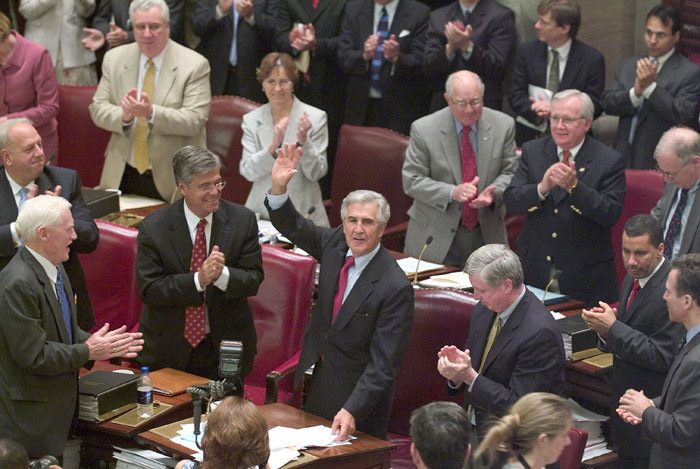
Copyright © 2020 Lone Oak Publishing Co., Inc. All Rights Reserved.
 Glens Falls Chronicle Serving the Glens Falls/Lake George region; Warren, Washington and northern Saratoga counties since 1980
Glens Falls Chronicle Serving the Glens Falls/Lake George region; Warren, Washington and northern Saratoga counties since 1980

